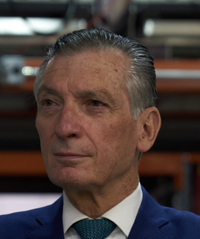
Plus Advent Calendar Door #19: What are liquid metal batteries?

Donald Sadoway
The world needs to move to renewable energy sources, such as solar or wind. The problem with those is that they're intermittent. That's because the Sun doesn't always shine and the wind doesn't always blow. What we need, then, are efficient ways of storing energy: efficient batteries. Currently lithium ion batteries are being used but there are issues around their cost, how long they last, and their safety.
Hope is on the horizon in the form of liquid metal batteries. At a recent event organised by the Newton Gateway to Mathematics in Cambridge we met Donald Sadoway, who played a very important role in pioneering these batteries. In this podcast he tells us what they are and why they are better, when they'll be commercially available, and why sometimes it's best to ignore the experts.
To watch a talk given by Sadoway at the Newton Gateway event go to the Newton Gateway website. And to find out more about magnetohydrodynamics, a theory that has been used to describe liquid metal batteries, go here.
Return to the Plus advent calendar 2022.
This podcast was produced as part of our collaboration with the Isaac Newton Institute for Mathematical Sciences (INI) – you can find all the content from our collaboration here. The INI is an international research centre and our neighbour here on the University of Cambridge's maths campus. It attracts leading mathematical scientists from all over the world, and is open to all. Visit www.newton.ac.uk to find out more.
